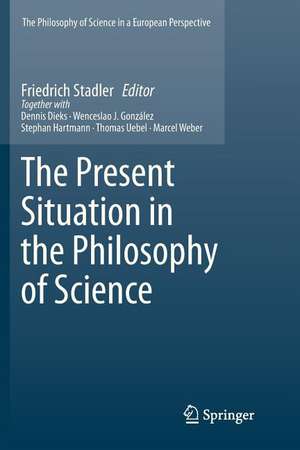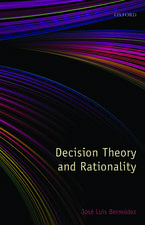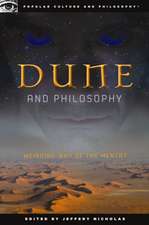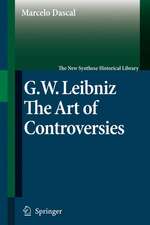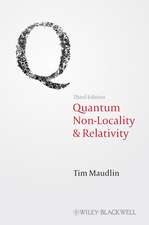The Present Situation in the Philosophy of Science: The Philosophy of Science in a European Perspective, cartea 1
Editat de Friedrich Stadleren Limba Engleză Paperback – 5 sep 2012
| Toate formatele și edițiile | Preț | Express |
|---|---|---|
| Paperback (1) | 950.52 lei 3-5 săpt. | |
| SPRINGER NETHERLANDS – 5 sep 2012 | 950.52 lei 3-5 săpt. | |
| Hardback (1) | 956.69 lei 6-8 săpt. | |
| SPRINGER NETHERLANDS – 10 iun 2010 | 956.69 lei 6-8 săpt. |
Preț: 950.52 lei
Preț vechi: 1159.17 lei
-18% Nou
Puncte Express: 1426
Preț estimativ în valută:
181.91€ • 187.92$ • 151.39£
181.91€ • 187.92$ • 151.39£
Carte disponibilă
Livrare economică 04-18 martie
Preluare comenzi: 021 569.72.76
Specificații
ISBN-13: 9789400732391
ISBN-10: 9400732392
Pagini: 424
Ilustrații: X, 325 p.
Dimensiuni: 155 x 235 x 22 mm
Greutate: 0.59 kg
Ediția:2010
Editura: SPRINGER NETHERLANDS
Colecția Springer
Seria The Philosophy of Science in a European Perspective
Locul publicării:Dordrecht, Netherlands
ISBN-10: 9400732392
Pagini: 424
Ilustrații: X, 325 p.
Dimensiuni: 155 x 235 x 22 mm
Greutate: 0.59 kg
Ediția:2010
Editura: SPRINGER NETHERLANDS
Colecția Springer
Seria The Philosophy of Science in a European Perspective
Locul publicării:Dordrecht, Netherlands
Public țintă
Upper undergraduateCuprins
History of the Philosophy of Science.- Some Remarks on Current History of Analytical Philosophy of Science.- History of Philosophy of Science as Philosophy of Science by Other Means?.- Aspects of Current History of Philosophy of Science in the French Tradition.- Reflections on Chimisso: French Philosophy of Science and the Historical Method.- Aspects of Current History of 19TH Century Philosophy of Science.- Well, and Pragmatism?.- Formal Methods.- Formal and Empirical Methods in Philosophy of Science.- The Bane of Two Truths.- Formal Methods in the Philosophy of Natural Science.- The Problem of Constrained Judgment Aggregation.- Aggregation Problems and Models: What Comes First?.- Philosophy of the Natural and Life Sciences.- Life in a Physical World: The Place of the Life Sciences.- Comments on Marcel Weber’s “Life in a Physical World: The Place of the Life Sciences”.- How Special are the Life Sciences? A View from the Natural Kinds Debate.- The Epistemology-Only Approach to NaturalKinds: A Reply to Thomas Reydon.- Reductionism in Biology: An Example of Biochemistry.- Reductionist and Antireductionist Stances in the Health Sciences.- Philosophy of the Cultural and Social Sciences.- Trends and Problems in Philosophy of Social and Cultural Sciences: A European Perspective.- State of the Art A Commentary on Wenceslao J. Gonzalez’ Contribution, “Trends and Problems in Philosophy of Social and Cultural Sciences: A European Perspective”.- Scientific Realism, the New Mechanical Philosophers, and the Friends of Modelling.- Is Naturalism the Unsurpassable Philosophy for the Sciences of Man in the 21st Century?.- What Does it Mean to Be a Naturalist in the Human and Social Sciences?.- Philosophy of the Physical Sciences.- Reichenbach and the Conventionality of Distant Simultaneity in Perspective.- On Various Senses of “Conventional” and Their Interrelation in the Philosophy of Physics: Simultaneity as a Case Study.- Determinism and Chance from a Humean Perspective.- What Remains of Probability?.- Humean Perspectives on Structural Realism.- The Characterisation of Structure: Definition versus Axiomatisation.
Textul de pe ultima copertă
This volume is a serious attempt to open up the subject of European philosophy of science to real thought, and provide the structural basis for the interdisciplinary development of its specialist fields, but also to provoke reflection on the idea of ‘European philosophy of science’. This efforts should foster a contemporaneous reflection on what might be meant by philosophy of science in Europe and European philosophy of science, and how in fact awareness of it could assist philosophers interpret and motivate their research through a stronger collective identity.The overarching aim is to set the background for a collaborative project organising, systematising, and ultimately forging an identity for, European philosophy of science by creating research structures and developing research networks across Europe to promote its development. As such under the general rubric of ‘the present situation in the philosophy of science’, the emphasis is on as a first step identifying traditions andresearch structures already present, and the directions in which this research was leading.The European perspective in philosophy of science is the inclusion of the historical roots of current debates and the focus on methodological problems that cross the various sub-disciplines. This historical dimension is complemented by the evident broad scope of European philosophy of science which embodies not only a strong tradition of history and philosophy of science, history of philosophy of science, but also philosophy with respect to the cultural and social sciences as part of (not separate to) the discipline, combined with more traditional philosophical issues and approaches, such as the application of formal methods, the problem of realism, determinism and chance or the natural kinds debate. This consideration of general philosophical questions in science is married to a strong tradition of engaging naturalistically with the particular philosophical issues in individual sciences wherethere exists a prerogative of being closely schooled in the relevant scientific theory and research context. Additionally, one can refer to particular positions, like ‘structural realism’, as ‘European’, having their origin and their centre of pursuit, and indeed their historical links, in the context of European research.
Caracteristici
Philosophy of Science in a European perspective Focus on the European tradition in philosophy of science Foundations and methodology of the natural an social sciences A strongly interdisciplinary approach towards philosophy of science
